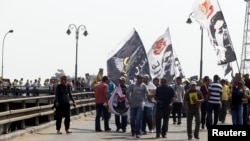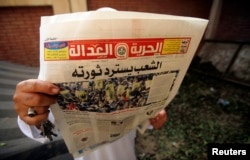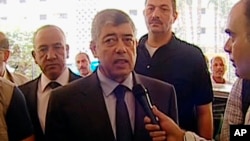CAIRO —
Two people were killed in skirmishes as supporters of deposed president Mohamed Morsi thronged Egypt's cities and towns on Friday for the third time in eight days, trying to rattle an army-backed government bent on crushing his Muslim Brotherhood.
But the authorities, who have killed hundreds of Morsi supporters and arrested most of its top leaders, pressed on with a campaign to neutralize Egypt's biggest political movement with a decision to clip its legal status.
Far from returning to normality after the army's overthrow of Morsi on July 3 following mass protests, the Arab world's most populous nation has remained on edge in fear of violence.
That fear was reinforced on Thursday when Interior Minister Mohamed Ibrahim survived a presumed suicide car bomb targeting his convoy, the culmination of a series of militant attacks.
Although it has yet to assign blame for that attack, the interim government has accused Brotherhood leaders of inciting violence, and portrayed the crackdown on the movement as a fight against terrorism - a view that many Egyptians endorse.
The new establishment has unveiled plans to revise the constitution to remove some Islamist-inspired amendments pushed through by Morsi, as well as lifting a ban on Mubarak-era officials returning to public office, before holding parliamentary and presidential elections early next year.
Friday's violence between Morsi supporters and either security forces or other supporters of the crackdown appeared more widespread than on either of the last two protest days.
A Reuters witness saw three men with swords set upon one of thousands of pro-Morsi protesters marching through Egypt's second city, Alexandria. Medical sources said one person involved in that protest was killed.
Another Morsi supporter was seen with birdshot wounds to the face, and Brotherhood supporters were seen punching and kicking a man they presumed to be hostile to them, the witness said.
State television showed footage of soldiers armed with assault rifles searching buildings in Alexandria, saying they were looking for gunmen who had opened fire on them.
One Morsi supporter was killed in Kafr el-Bateekh in Damietta province in clashes with government supporters where rocks, sticks and birdshot were used, according to witnesses and a medical official.
Tear Gas
In both Tanta in the Nile Delta and the southern city of Assiut, security forces used tear gas.
About 2,000 people marched in the Cairo district of Nasr City and 3,000 people in the port city of Suez.
There were also marches in Fayoum, three other cities in Assiut governorate and in eight cities in Minya governorate.
In the Delta city of Damanhour, hundreds took to the streets in a pro-government march, chanting “No to terrorism” and “Army, police and people are one hand”.
As with previous days of protest, the marches received scant coverage on tightly-controlled state television channels and privately-owned Egyptian media hostile to the Brotherhood.
Islamist-run stations were shut down after Morsi was deposed, leaving it to Al Jazeera's Egyptian channel, banned but still transmitting from its base in Qatar, to show live footage of Friday's marches.
Separately, authorities announced they would within days dissolve a non-governmental organization registered by the Muslim Brotherhood in March.
Although short of a complete ban on the group, dissolving the NGO will strip the Brotherhood, which says it has a million members, of a defense against challenges to its legality.
The move stems from accusations that the group, which has won five consecutive national votes since autocratic president Hosni Mubarak's fall to a popular uprising in 2011, used its premises to store weapons and explosives.
The decision will be announced by Social Solidarity Minister Ahmed el-Boraie within days, his spokesman Hany Mahana said.
“Dr. el-Boraie has decided to dissolve the organization. The decree has not been issued yet,” he said.
Since July, the army-backed authorities have killed more than 900 of Morsi's faithful and arrested most of the movement's leaders, including Morsi, on charges of murder or inciting violence against anti-Brotherhood protesters.
The group says the charges are an excuse for the crackdown.
Militant Islamists have also attacked police and churches. More than 100 members of the security forces have been killed since Aug. 14, when the police killed hundreds of people while breaking up pro-Mursi protest camps in Cairo.
Assassination Attempt
One of the authors of that operation, Interior Minister Ibrahim, was the target of an assassination attempt on Thursday. A massive car bomb, almost certainly the work of a suicide bomber, blew up near his convoy as he set off for work, and his armored car was riddled with bullets.
A security source said three people had been killed in the blast: the person who detonated the bomb, a passerby who had died of their wounds, and a third person who was not identified.
The attack, staged in broad daylight, was by far the boldest since Morsi's overthrow, and its size and sophistication showed the risk that Egypt's crisis could spawn a wave of Islamist attacks like those it experienced in the 1980s and 1990s.
Radical Islamists have already stepped up an insurgency in the Sinai Peninsula since Morsi was overthrown, and online calls from Islamists for an even more violent response have grown.
But the authorities, who have killed hundreds of Morsi supporters and arrested most of its top leaders, pressed on with a campaign to neutralize Egypt's biggest political movement with a decision to clip its legal status.
Far from returning to normality after the army's overthrow of Morsi on July 3 following mass protests, the Arab world's most populous nation has remained on edge in fear of violence.
That fear was reinforced on Thursday when Interior Minister Mohamed Ibrahim survived a presumed suicide car bomb targeting his convoy, the culmination of a series of militant attacks.
Although it has yet to assign blame for that attack, the interim government has accused Brotherhood leaders of inciting violence, and portrayed the crackdown on the movement as a fight against terrorism - a view that many Egyptians endorse.
The new establishment has unveiled plans to revise the constitution to remove some Islamist-inspired amendments pushed through by Morsi, as well as lifting a ban on Mubarak-era officials returning to public office, before holding parliamentary and presidential elections early next year.
Friday's violence between Morsi supporters and either security forces or other supporters of the crackdown appeared more widespread than on either of the last two protest days.
A Reuters witness saw three men with swords set upon one of thousands of pro-Morsi protesters marching through Egypt's second city, Alexandria. Medical sources said one person involved in that protest was killed.
Another Morsi supporter was seen with birdshot wounds to the face, and Brotherhood supporters were seen punching and kicking a man they presumed to be hostile to them, the witness said.
State television showed footage of soldiers armed with assault rifles searching buildings in Alexandria, saying they were looking for gunmen who had opened fire on them.
One Morsi supporter was killed in Kafr el-Bateekh in Damietta province in clashes with government supporters where rocks, sticks and birdshot were used, according to witnesses and a medical official.
Tear Gas
In both Tanta in the Nile Delta and the southern city of Assiut, security forces used tear gas.
About 2,000 people marched in the Cairo district of Nasr City and 3,000 people in the port city of Suez.
There were also marches in Fayoum, three other cities in Assiut governorate and in eight cities in Minya governorate.
In the Delta city of Damanhour, hundreds took to the streets in a pro-government march, chanting “No to terrorism” and “Army, police and people are one hand”.
As with previous days of protest, the marches received scant coverage on tightly-controlled state television channels and privately-owned Egyptian media hostile to the Brotherhood.
Islamist-run stations were shut down after Morsi was deposed, leaving it to Al Jazeera's Egyptian channel, banned but still transmitting from its base in Qatar, to show live footage of Friday's marches.
Separately, authorities announced they would within days dissolve a non-governmental organization registered by the Muslim Brotherhood in March.
Although short of a complete ban on the group, dissolving the NGO will strip the Brotherhood, which says it has a million members, of a defense against challenges to its legality.
The move stems from accusations that the group, which has won five consecutive national votes since autocratic president Hosni Mubarak's fall to a popular uprising in 2011, used its premises to store weapons and explosives.
The decision will be announced by Social Solidarity Minister Ahmed el-Boraie within days, his spokesman Hany Mahana said.
“Dr. el-Boraie has decided to dissolve the organization. The decree has not been issued yet,” he said.
Since July, the army-backed authorities have killed more than 900 of Morsi's faithful and arrested most of the movement's leaders, including Morsi, on charges of murder or inciting violence against anti-Brotherhood protesters.
The group says the charges are an excuse for the crackdown.
Militant Islamists have also attacked police and churches. More than 100 members of the security forces have been killed since Aug. 14, when the police killed hundreds of people while breaking up pro-Mursi protest camps in Cairo.
Assassination Attempt
One of the authors of that operation, Interior Minister Ibrahim, was the target of an assassination attempt on Thursday. A massive car bomb, almost certainly the work of a suicide bomber, blew up near his convoy as he set off for work, and his armored car was riddled with bullets.
A security source said three people had been killed in the blast: the person who detonated the bomb, a passerby who had died of their wounds, and a third person who was not identified.
The attack, staged in broad daylight, was by far the boldest since Morsi's overthrow, and its size and sophistication showed the risk that Egypt's crisis could spawn a wave of Islamist attacks like those it experienced in the 1980s and 1990s.
Radical Islamists have already stepped up an insurgency in the Sinai Peninsula since Morsi was overthrown, and online calls from Islamists for an even more violent response have grown.







